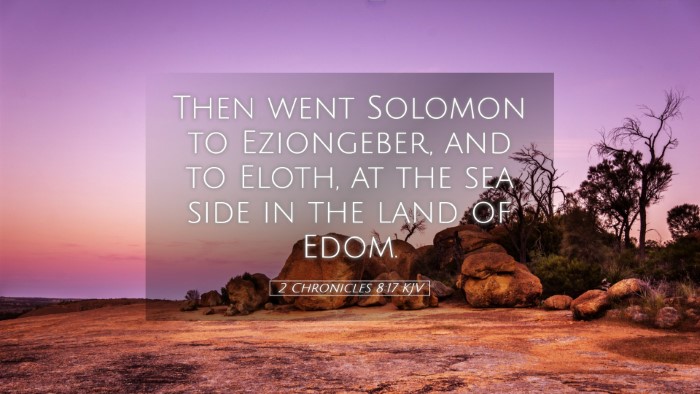Commentary on 2 Chronicles 8:17
In 2 Chronicles 8:17, we read: "Then Solomon went to Ezion-geber and Eloth on the seashore in the land of Edom." This verse holds significance within the account of Solomon's reign, particularly in relation to his maritime ambitions and trade endeavors.
Contextual Analysis
Understanding the historical context surrounding this verse is pivotal. Solomon's extensive building projects, diplomacy, and trade relate directly to how he established Israel's prominence. During this period, the nation of Israel was not only a center of worship but also a burgeoning trade empire.
Geographical Importance
Ezion-geber and Eloth are located at the northeastern tip of the Gulf of Aqaba, the natural sea route for trade between the interior of the land, including Israel and beyond. The following insights can enrich our understanding:
- Ezion-geber: This port became a significant naval base for Solomon. The name translates to "The Stone of the Geber," with "geber" indicating a mighty or strong one, illustrating the strength achieved through naval power.
- Eloth: A port city, also known as Elim, served as another critical point for maritime trade and connections with other civilizations.
Theological Insights
This verse reflects Solomon's endeavors to expand his influence and prosperity through commerce and trade. Theological implications that emerge include:
- The Divine Mandate of Kingship: Solomon was fulfilling the divine mandate given to him. God granted him wisdom, riches, and honor to accomplish his tasks, as noted in earlier chapters.
- God's Sovereignty in Trade: The movement toward trade ports illustrates God's hand in the success and expansion of His people. Solomon's wisdom in establishing these routes demonstrates the interplay of divine providence with human effort.
- National Identity and Materialism: The verse prompts reflections on how material wealth and national identity can coalesce, and how this was portrayed during Solomon's reign. Cautionary insights may be derived from Solomon's later life, as the pursuit of wealth led to spiritual decline.
Exegesis of Terms
Conducting an exegesis on this passage, it is essential to explore the key terms:
- Solomon: Represents wisdom and a legacy of peace; implicated in both wisdom and wealth, his decisions had long-lasting repercussions for Israel.
- Ezion-geber and Eloth: The mention of these places emphasizes Solomon's ambition. Each port was a testament to the kingdom’s reach and economic strategy.
- Seashore: Symbolizes not only geographical boundaries but also extended influence into the wider world, highlighting the commercial aspirations of Israel.
Insights from Commentaries
The commentaries from notable figures further enhance our understanding:
Matthew Henry
Henry emphasizes God's providence in directing Solomon’s path toward establishing trade routes. He notes that “a good king will look to his own honor and the good of his people.” This reveals that Solomon’s excursions were not solely for material gain but were part of a greater vision for Israel’s prosperity.
Albert Barnes
Barnes touches on the logistical achievements involved in seaborne trade. He offers insights into how Solomon’s endeavors would collide with the political dynamics of neighboring regions, hinting at the complexity of international relations during this era.
Adam Clarke
Clarke provides a practical lens on this passage, discussing the implications of building a strong navy and commerce in securing peace and stability. He speculates on the potential future conflicts that may arise from Solomon’s expanding influence and the balance of power in the region.
Application for Today
Reflecting on 2 Chronicles 8:17, we can draw various applications for contemporary life:
- Leadership and Responsibility: Leaders today can take lessons from Solomon's ambition to oversee his kingdom's growth while remaining attentive to spiritual integrity.
- Economic Strategy: Trade and commerce remain vital to the growth of nations, and contemporary leaders can look into the principles that governed Solomon’s decisions.
- Spiritual Fidelity amidst Prosperity: The later chapters of Kings illustrate how prosperity without spiritual vigilance can lead to downfall, prompting reflections on how to maintain faith in times of abundance.
Conclusion
2 Chronicles 8:17 stands as a brief yet potent verse that encapsulates the heights of Solomon's reign in terms of ambition, commerce, and divine providence. It serves both as a historical account and a source of spiritual reflection, offering important insights for scholars, pastors, and students alike.


